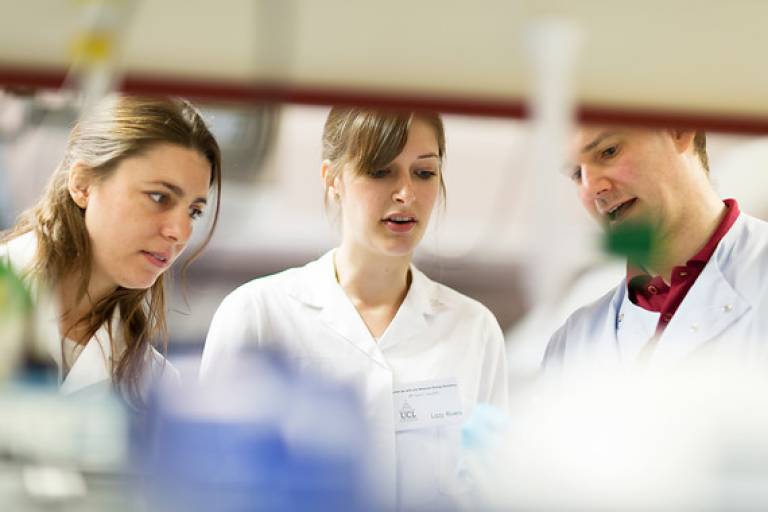UCL has an outstanding portfolio of training opportunities in basic and translational biomedical science for non-clinical graduates in doctoral training programmes to post-doctoral training schemes.

We support excellence across the entire range of biomedical science, including industrial studentships and cross-cutting work between different Faculties and Schools at UCL. The UCL School of Life and Medical Sciences hosts a large group of excellent PhD programmes in many different areas of biomedical science. We partner with other organisations like the NIHR Biomedical Research Centre and Unit associated with UCL and the Francis Crick Institute to provide a huge breadth of training opportunities. Doctoral students not only receive an excellent scientific training, but we encourage a much wider range of generic and transferable skills training through the UCL Graduate School, bespoke training courses in individual Divisions and Institutes, and through the Academic Careers Office itself.
Applying to a programme at UCL is often very competitive and you need to prepare your application well. Use the links below to explore the individual programmes that we offer and research how to effectively identify a supervisor and select a project. Different programmes have slightly different application procedures and ways of matching students to individual projects, but the underlying principles behind taking your first steps into academic training are shared by all PhD programmes.
- UCL-Birkbeck MRC Doctoral Training Programme
- UCL Graduate Research Programmes
- Wellcome Trust Biomedical Vacation Scholarships
You may also wish to consider the resources available through the Experimental Medicine Academy.
Useful Links:
- NIHR Biomedical Research Centres;
- Francis Crick Institute;
- UCL Doctoral School;
- Experimental Medicine Academy.
Advice for Potential Phd Students
- Selecting Your Supervisor
Selecting your supervisor is one of the most important things you will do in your academic career, so you need to take your time and do your research. Finding a supervisor is not difficult, but many excellent supervisors may not be immediately obvious. You should carefully research each potential supervisor as well as meet with them in person as well as with members of their research group. Ask around, use the UCL website and PubMed to draw up a short list of supervisors. You can approach anyone on your short list easily; all supervisors receive many potential applications by email and so an email out of the blue is completely normal. Make sure you write a short but compelling email summarising your current position, your specific interest in a PhD with potential starting times, thoughts about potential funding sources (if you know of any) and attach your CV. If the supervisor is interested in meeting with you then they will set up a short meeting. Don't panic - you are not being interviewed and this is generally a friendly chat to establish interest. You should have some ideas about what you might like to do, but do not need a fully developed project at this stage.
Three golden rules that should guide your search for a supervisor:
- Your potential research supervisor should have a track record of internationally recognized research, with high quality peer-reviewed publications commensurate for their career to date. Look at their PubMed entry and check that you can discern a clear theme to their research; check their research group website for further details of publications and citations. You want to be able to work in a research group of a world leader, or an up-and-coming leader in their field.
- Regardless of your potential supervisor's publication track record and/or general status in the field, you must meet them before making any decisions. The professional relationship between supervisor and supervisee will last several years, and for many people this will be the longest they have ever spent in one place. So meet and chat with your potential supervisor and get an idea about what sort of a supervisor they will be and whether you would like to work with them. Gut feelings are important at this stage; you need to be able to get on with your supervisor, but also be inspired and guided by them.
- When you meet your potential supervisor, you must also meet existing students in their research group. If there aren't any, this is generally a bad sign. Even research groups starting out usually have one or two members, although they may not be clinical fellows but perhaps basic scientists. This doesn't matter; the purpose of meeting the research group members is to find out what the dynamics of the research group are like and how the group leader (your potential supervisor) treats them. It goes without saying that you need such a meeting to take place without the group leader being present, so you get an honest opinion!
- Finding Your Funding
Sometimes you will be able to apply for a personal Fellowship, but more commonly you will apply for a funded studentship from the many programmes that UCL hosts. UCL has a large selection of PhD programmes with core funding from major funders such as the Wellcome Trust and MRC. The programmes are all appropriate for graduates with either an undergraduate or Masters qualification in a relevant subject, and provide either three or four years funding with stipend and fees. You apply to the programme rather than to an individual supervisor, but you should check that supervisors you are particularly interested in are a member of the programme! Each programme runs application, shortlisting and interview processes to its own deadlines; but these are generally in Dec/Jan of each year for admission to a PhD the following Fall. If you are not a home/EU student, then your eligibility to apply for the programme may vary and you should check with the individual programme pages (or with prospective supervisors). In particular, non-home/EU students may need to apply for additional or supplementary scholarships to cover the increased fees payable for PhD study.
- Developing Your Project
Many people who approach a potential supervisor do not initially have a fully developed and detailed description of a project they want to undertake. This is absolutely fine - in fact, having a very detailed and predefined project can be difficult for potential PhD students or clinical fellows, as it might not fit within an academic environment, the specific supervisors available, or within three year project timeframe. But equally, it is best not to search for a supervisor and a project without any idea at all of what you want to do. Developing a project is therefore a flexible, iterative affair where the trainee identifies a potential supervisor; discusses potential projects of mutual interest; and then works up a specific project into a Fellowship application. This process can take several weeks or months so it is important you leave enough time to undertake this stage. Getting it right is important, because a successful project with an outstanding supervisor is the foundation of your future academic career. A good project is one that addresses a clearly articulated scientific question or hypothesis of basic or clinical importance; that is achievable within a three year time frame; and has challenging but realistic goals.
- Useful Links
 Close
Close



